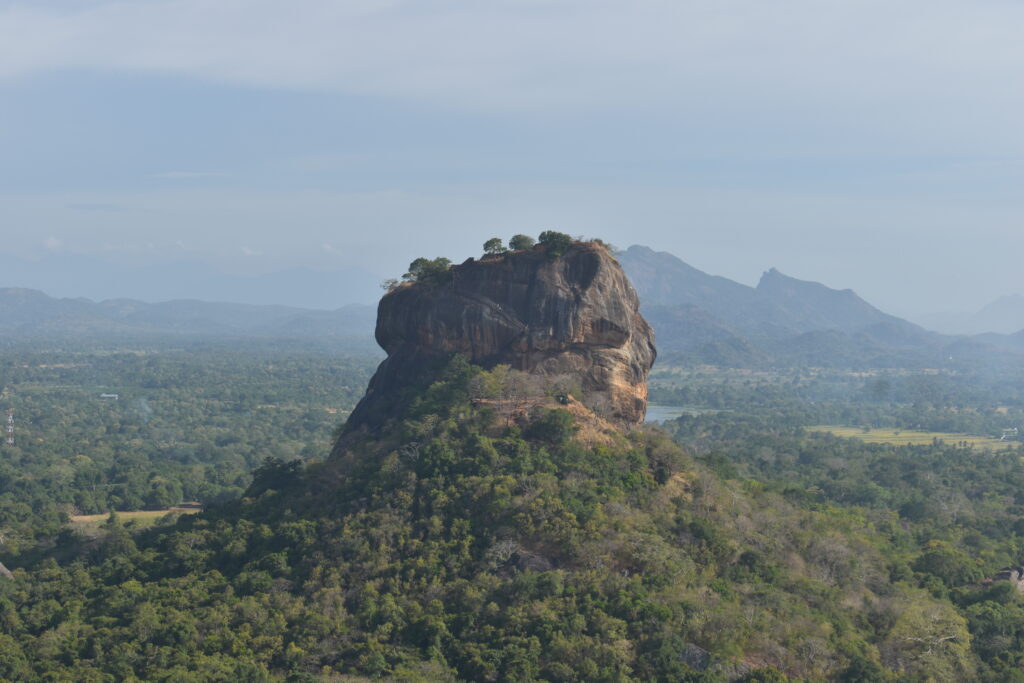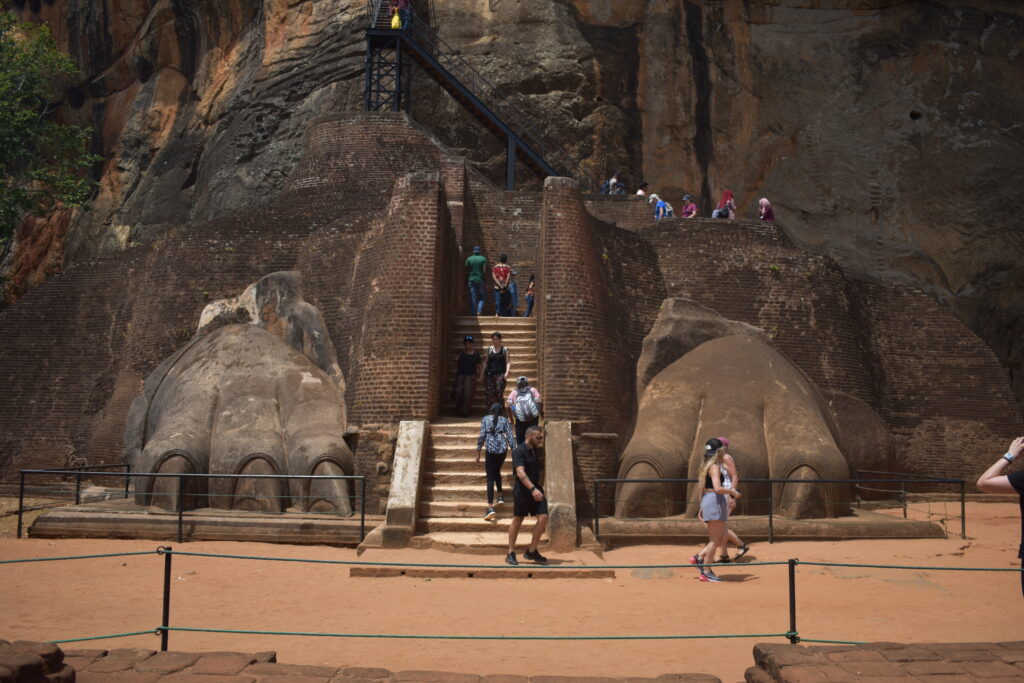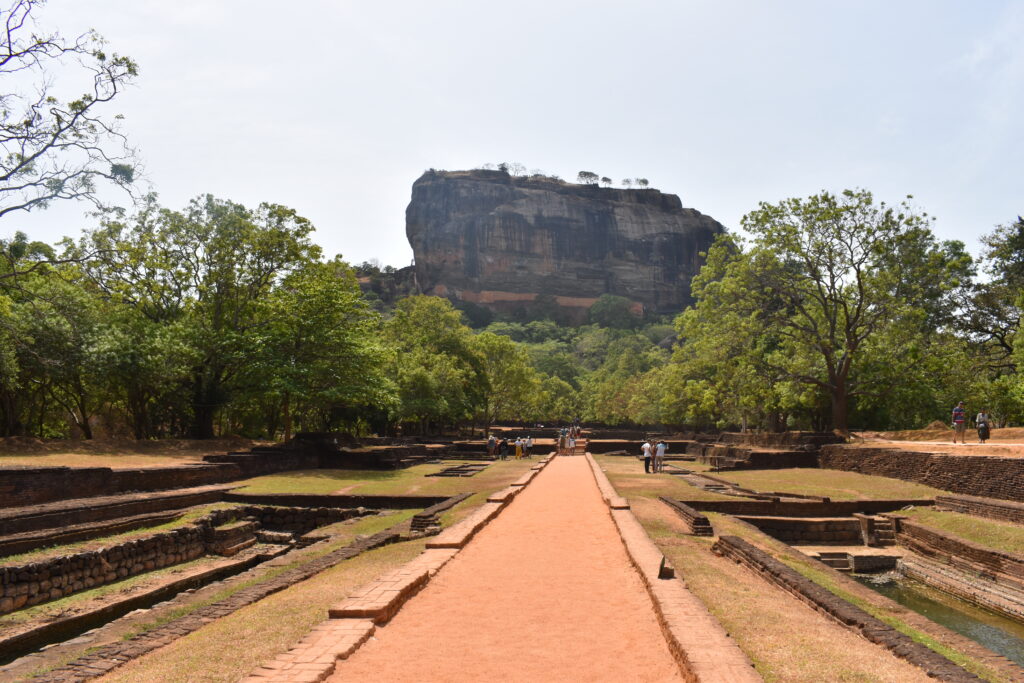Eighth Wonder of World
Sigiriya is an ancient rock fortress that was built in the 3rd century BC and it’s been a monastery for over 800 years, has also been declared by UNESCO as the 8th Wonder of the World. In the 5th century it became the Royal palace and fortress of King Kassapa. He is a son of King Dhathusena, but he murdered his father by walling him up alive and then usurping the throne which rightfully belonged to his half-brother Moggallana. He ruled the country from Lion Rock for 18 years. more than 5,000 soldiers came and invaded and won, king Kassapa had to suicide.
The surface has a complex hydraulic water system from ancient times that is still functional today! During the rainy season, the water channel filled up and water efficiently circulates through the entire fortress. This system is still too advanced for this period and a big curiosity remains about where this technology comes from.
The rock is called lion rock, and it rises up 200m approximately 600m, and 12000 steps are there. the talent of urban architecture of the first millennium in Sri Lanka can’t be imaginative, combined concepts of symmetry and asymmetry to surroundings are used efficiently for a fortress that looking forward to a war.
Sigiriya is considered an engineering marvel, This is basically two parts
Massive royal garden at the base
The royal palace at the top
This world’s oldest landscaped garden is divided into 3 parts
Water Garden
Boulder and Cave Garden
Terraced garden
In village people and among the Country has a story said by a blind old man who lives nearby Lion Rock, That old man said once too, few researchers who came to explore sigiriya rock, he said that in past, when the British controlled the country Mr H.C.P Bell found the lion rock and he got the help of villagers to explore and took the treasure out from the rock fortress, finally he put heavy concrete to the hidden door and close it for forever. And that blind old man was not blind on that period, after they did it everyone who participated to do that, was passed away suddenly and he lost his vision, he said, it happened because of ghost power,
In addition, imagine how the king reached the top, Do you think he climbed all the stairs from outside in sunny time, or go with the help of people to the top, or is he trust his workers can hold him to the top in the dangerous pathway, no definitely bottom of the lion rock has some way to go to up quickly to the king, it called Karkataka machine, it’s like a modern lift. And also folklore inside the Lion Rock has seven stores. they had a huge water control system, do not have lift to go to the top for the king.
This wonderful fortress in the shape of a lion, is a great masterpiece of Ceylon ancient architecture, Exploring this fortress more and more archeologist realizes this is a major urban of ancient Sri Lanka than a fortress because they found ruins from the garden of the east side of Sigiriya which has more tools used to made clay pots, pieces of jewelry, agriculture equipment, and foreign coins, foreign goods, etc. There was a place called Mapagala which is considered the workplace of lion rock, it also has a big two-stone wall one after, and bigger and smaller blocks were used. And sigiriya tank also spread in the past covering that area.

Sigiriya has been made famous throughout the world for the focus on it pictures of the two women in rock surface wall and advanced water systems. It is registered as a world heritage site, visitors to the palace have to enter through a stone stairway that takes them into the lion’s mouth and through its throat. Only the lion’s massive paws remain today, but they indicate how gigantic the rest of the carvings must have been. A new stairway has been attached to the side of the rock to allow access to the summit. Enabling visitors to stroll around the ruins of the palace and gasp at the panoramic views.
Two water tanks, used for bathing and drinking, still fill with rain water, but a sophisticated pumping system had been used to fill the tanks from the lake at the foot of the rock.
The most famous feature of Sigiriya are the fifth-century paintings found on the rock, the painting of the two female figures preserved on the rock face. The figures represent the Apasarawa or celestial nymphs which are the common motif of Asian arts. These paintings have attracted people from all over the country in the past and modern times from everywhere in the world. In The Lion rock, there are more than 200 Pictures of those women and there were two major women considered as
Black and blue Women(Mega Latha^) angle for rain
Gold color women(Vishnu Latha^) angle for Lightning
But archeologists have given different ideas about those women, Pro H.C.P Bell said King Kassapa had two daughters called Uppalawana and Bodhi and they were behind a group carrying flowers and they faced to Northside which Pidurangala Monastery side and worshiped for them,
Black and Blue Women (Uppalawanna)
Gold color women (Bodhi)
People who visited in the past had written poems by looking at them on the rock wall. (this is considered as a world-first comments wall) and they are known as the Sigiri Graffiti. The sigiri Graffiti on the mirror wall dates from about the 6 to 14 th century and are mostly addressed to the ladies in the paintings. About 700 of these were deciphered by professor Senarth Paranawithana, Sri lanka foremost Epigraphist. The poems expressed the visitor’s emotions and comments on the beauty in the paintings.

The gardens of Sigiriya are unique and are one of the oldest landscaped gardens in the world. The water garden in the sigiriya is the most interesting garden, occupying the central section of the western precinct. There are three water gardens lying along the east-west axis, The central island is surrounded by water in the largest garden and linked to the main precinct by causeways.
The Sigiriya palace complex consists of three distinct parts. The outer palace(lower palace) occupies the lower eastern part of the summit. The inner palace (Upper palace) occupies the high western section. The palace garden occupies the south, and the three sectors converge on a large beautiful rock-cut pool. The layout and the ground plan of the palace are still clearly visible. and archeologists did measurements if you draw a line from the middle of the rock, which is divided into equal two parts, the main road directly divided it into equal two parts.


